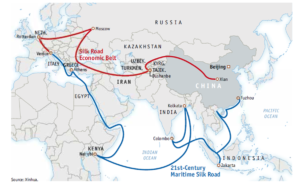Dr. Abdul Ruff
The loss of a mighty Soviet empire stills haunts Russians, their leaders. Russian President Putin has not made any secret of his anguish and anger over the sudden disintegration of Soviet Union that made Russia a less important super power. Initially, Putin worked hard to rebuild the Soviet state but could not succeed as many former Soviet republics now independent nations refused to join the Russia-dominated single country. The way he crushed the Chechens on his ascendance to presidency forced many of those pro-Russia states within the Soviet space to rethink their desire to promote a mighty Russia.
Putin has been making conscious efforts to rebuild the former Soviet states in some format by launching economic, political and military formations but they have not become as successful as the Warsaw Pact or COMCON had been during the Cold War.
The concept of Eurasia – bringing Europe and Asia together- got a Phillip under Putin who is eager to see the region emerge more significant and larger continent than EU in all respects, especially in economics and defense. However, USA is not impressed by the Russian move to counter its NATO in the longer context.
Inspired by the Chinese initiative of OBOR and its vast potentials for the region covering three continents, Russian President Vladimir Putin said in Beijing on May 14 that he saluted China’s “large-scale” Belt and Road Initiative and called for greater Eurasian partnership. Putin made the remarks at the opening ceremony of the Belt and Road Initiative Forum for International Cooperation taking place in Beijing on May 14-15.
The Belt and Road Initiative proposed by China in 2013 consists of the Silk Road Economic Belt and the 21st-Century Maritime Silk Road. It aims to build a trade and infrastructure network connecting Asia with Europe and Africa along and beyond the ancient Silk Road trade routes.
During a visit to Moscow in May 2015, Chinese President Xi Jinping signed an agreement with Putin on aligning the Belt and Road Initiative with the EEU, which currently groups Russia, Kazakhstan, Belarus, Kyrgyzstan, and Armenia.
Calling the Belt and Road Initiative an example of cooperation in such fields as infrastructure, transport, and industry, the Russian president said his country had supported the initiative from the very beginning. He said the historical experience of cooperation between countries linked by the ancient Silk Road through Asia, Europe, and Africa is important in the 21st century when the world is facing “far-reaching challenges.”
Putin called for more cooperation to meet global challenges like unbalanced development in globalization, poverty and regional conflicts, saying that Russia is working with its partners to advance the Eurasian Economic Union (EEU), among others.
The integration of the Belt and Road Initiative, the EEU, the Shanghai Cooperation Organization and the Association of Southeast Asian Nations (ASEAN) has laid the groundwork for building a great Eurasian partnership, he said.
Meanwhile, Putin urged concrete actions to materialize the existing initiatives by facilitating the flow of goods, cooperation between enterprises of different countries in Eurasia, infrastructure construction and establishment of joint and large-scale research institutions. He said the Belt and Road Initiative proposed by China is “very timely and promising.”
China goes further than Russia’s Eurasia n approach with its OBOR concept to include the African continent as well. Both ideas are, however, despised by Washington that considers Russia-China alliance the most dangerous to its global military supremacy scheme.
Already, China is very close to USA in economic and military dolmans.

